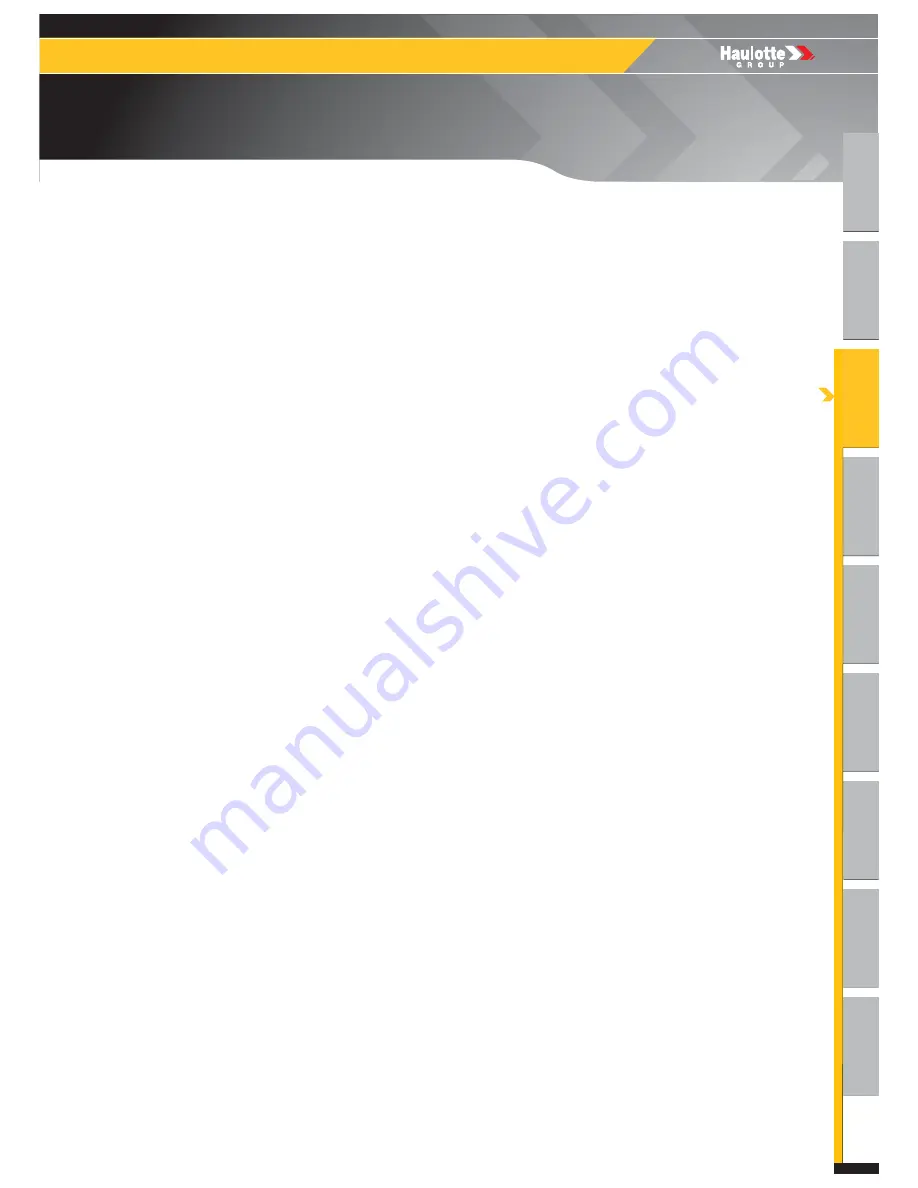
A
B
C
D
E
F
G
H
I
57
4000328850
E 12 14
USA / GB
C
- Pre-operation inspection
HA32PX - HA100JRT - HA41PX-NT - HA130JRT-NT
Pre-operation inspection
1 - Recommendations
The owner, the site manager, the supervisor and the operator are all responsible to ensure the machine
is fit for the work it is to perform; i.e. that the machine is suitable to carry out the work in complete safety
and in compliance with this Operator's Manual. All managers who are responsible for persons
operating the machine must be familiar with the local regulations currently applicable in the country of
use and ensure that they are adhered to.
Before using the machine, read the previous chapters in this manual. Ensure that you have understood
the following points :
• Safety precautions.
• Operator's responsibilities.
• Conditions and the operating principles of the machine.
2 - Working area assessment
To ensure safety during operation, the following should be considered :
• Segregate other site traffic (delivery vehicles, dumpers, etc) from the work area.
• Check the work area for localised features, e.g. manholes, service ducts, potholes, etc.
• Check ground covers (temporary and permanent) are strong enough to withstand the applied
pressure
• Check ground covers are secured and monitor them. Take similar action for permanent covers.
• Establish the load bearing capacity (distributed load and point loading, e.g. outriggers) when working
inside a building or on a structure.
• Provide supervision to ensure safe systems of work are appropriate and being used.
• Check for overhead crushing and contact hazards.
• Check weather conditions have not altered ground conditions (e.g. heavy or prolonged rain).
• Establish limits for safe operation (e.g. maximum wind speed). Remember conditions can change
internally (e.g. if roller doors are opened).
• Comply with permit to work systems where sites have them (e.g. chemical plants).
• Provide a rescue plan for all risks, including falls and crush hazards. Ensure personnel understand
and are appropriately trained in the rescuing procedures. Site based personnel trained in operation
of functions and in the emergency lowering systems from the ground control box should be present.
• Assess other alternative work methods or equipment before operating near a steep slope. If the
machine must be placed near an edge or steep slope, ensure barriers are available to support the
weight of the machine. Take into consideration the machine's stopping distance. If this is not
possible, evaluate and establish the placement of machine and sequence of operations so that the
aerial work platform can operate in a safe manner (e.g. machine is in line with the edge rather than
towards the edge).
Extra care must be taken if aerial work platforms are used to manoeuvre up through several levels of
steelwork. There is a risk of the operator being trapped should the boom or basket strike the steelwork.
This risk increases with the number of steelwork levels and if material is piled up on lower level reducing
the spacing between levels.
Summary of Contents for HA100JRT
Page 2: ...2 4000328850 E 12 14 USA GB HA32PX HA100JRT HA41PX NT HA130JRT NT...
Page 8: ...8 4000328850 E 12 14 USA GB HA32PX HA100JRT HA41PX NT HA130JRT NT A Foreword Notes...
Page 22: ...22 4000328850 E 12 14 USA GB HA32PX HA100JRT HA41PX NT HA130JRT NT A Foreword Notes...
Page 118: ...118 4000328850 E 12 14 USA GB F Maintenance HA32PX HA100JRT HA41PX NT HA130JRT NT Notes...






































